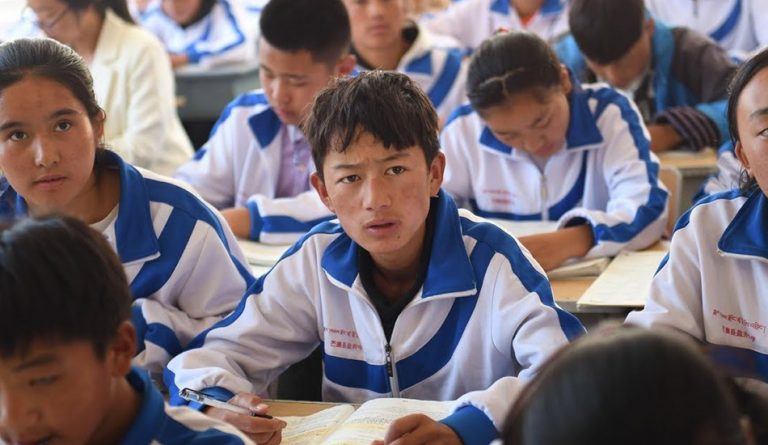A report released by the The Tibet Action Institute (TAI) on Dec. 7 describes how children in Tibet as young as four have been forced into attending a vast boarding school system created by the Chinese regime. Students in these schools receive a “politicized” education, mainly in Chinese, and are unable to practice Tibetan traditions, the group’s report says.
The schools are a cornerstone of the Chinese Communist Party’s (CCP) campaign to replace other cultural heritages with a homogenous Chinese identity in order to eliminate potential resistance to Beijing. This has also been seen across mass concentration camps in western China’s Xinjiang region, where vast numbers of Uyghur Muslims are forced into imprisonment and stripped of their religious traditions and beliefs.
In a speech in 2014, Chinese Xi leader emphasized the need to “bind the people of each ethnic group into a single strand of rope.” The following year, the People’s Republic of China (PRC) State Council urged officials to “strengthen boarding school construction” in ethnic minority areas and “steadily promote bilingual education.”
The TAI’s report, titled “Separated From Their Families, Hidden From the World: China’s Vast System of Colonial Boarding Schools Inside Tibet,” finds that an estimated 800,000 to 900,000 Tibetan students aged six to 18, as well as an unknown number of four and five-year olds, are currently enrolled in these state-run schools across Tibet.
Forced into CCP indoctrination
The schools function as sites for “re-molding” children into citizens loyal to the CCP. Removed from their families and communities, students must study primarily in Chinese, are barred from practicing the Tibetan Buddhist religion and traditional customs, and are routinely subjected to political indoctrination.
Success
You are now signed up for our newsletter
Success
Check your email to complete sign up
“By intentionally uprooting Tibetan children from their families and culture and making them live in state-run boarding schools, the Chinese authorities are using one of the most heinous tools of colonization to attack Tibetan identity,” said Lhadon Tethong, Director at the TAI.
The CCP’s “unprecedented campaign of forced sinicization in Tibet targets even the youngest children and demands the urgent intervention of the United Nations and concerned governments,” he added.
The report also reveals that over the last decade, CCP authorities have systematically eliminated local schools in Tibet, replacing them with this centralized school system. Even nursery and elementary schools were forced to shut down. Monastery schools and other privately run Tibetan schools have also been forced to shutter under pressure from Beijing, leaving parents with no choice but to send their children to these state-run schools. In cases where parents try to resist, authorities have used threats and intimidation to ensure compliance.
Parents threatened or intimidated into giving away their children
When parents in the remote village of Gyirong resisted sending their children to a Chinese-run boarding school, they were visited multiple times by authorities. Finally, police arrived along with social workers and said: “…If we have to come back tomorrow, it won’t be good for you.…If you don’t listen [to us] we will squeeze [pressure] you one by one. That is easy for us to do….If you continue to choose not to acknowledge this policy and refuse to send your children to the schools, we will consider this to be an act of protest.”
Researchers focusing on the Tibet Autonomous Region and other areas in China populated by Tibetans have documented serious emotional and psychological trauma as a result of Tibetan children being forced to live in these colonial-styled boarding schools. The students are also not allowed to go back home for visits and their families are not allowed to see them without prior approval from school staff.
Interviews with Tibetans who attended these schools in the past and are now living abroad revealed a harrowing picture where children were forced to live in poor conditions, sometimes even subjected to physical and sexual abuse. The children would be routinely discriminated against by teachers and subject to political indoctrination as part of their everyday school curriculums.
‘Losing the very fabric of your humanity’
The Globe and Mail reported that one Tibetan identified by the pseudonym Tenzin so he could speak freely, without concern for his family back in Tibet – said that while instruction was still largely in a Tibetan language, “the content of what we studied was almost all Chinese. The history we studied was all Communist or Chinese-centred, even when we studied world history.” He added that students were not allowed to go home on weekends or even on holidays, “for the whole of [my first year] I did not see my parents,” he said.
Tenzin, who is now living in the U.S., said “now kids as young as five years old are being taken from their hometowns and environments and put in this school system. When you are cut off from your language and culture and history, you lose a sense of who you are, and eventually it feels like you’re losing the very fabric of your humanity,” he said. “You don’t feel complete.”
TAI director Tethong added that the Party “claims to be educating Tibetan children, but the world knows what it looks like when children are pushed into residential schools run by a state that wants to wipe out their culture,” he said. “Beijing must be pressed to respect the right of all Tibetan children to receive a high-quality mother-tongue education without being separated from their families, before any more irreparable harm is done.”














